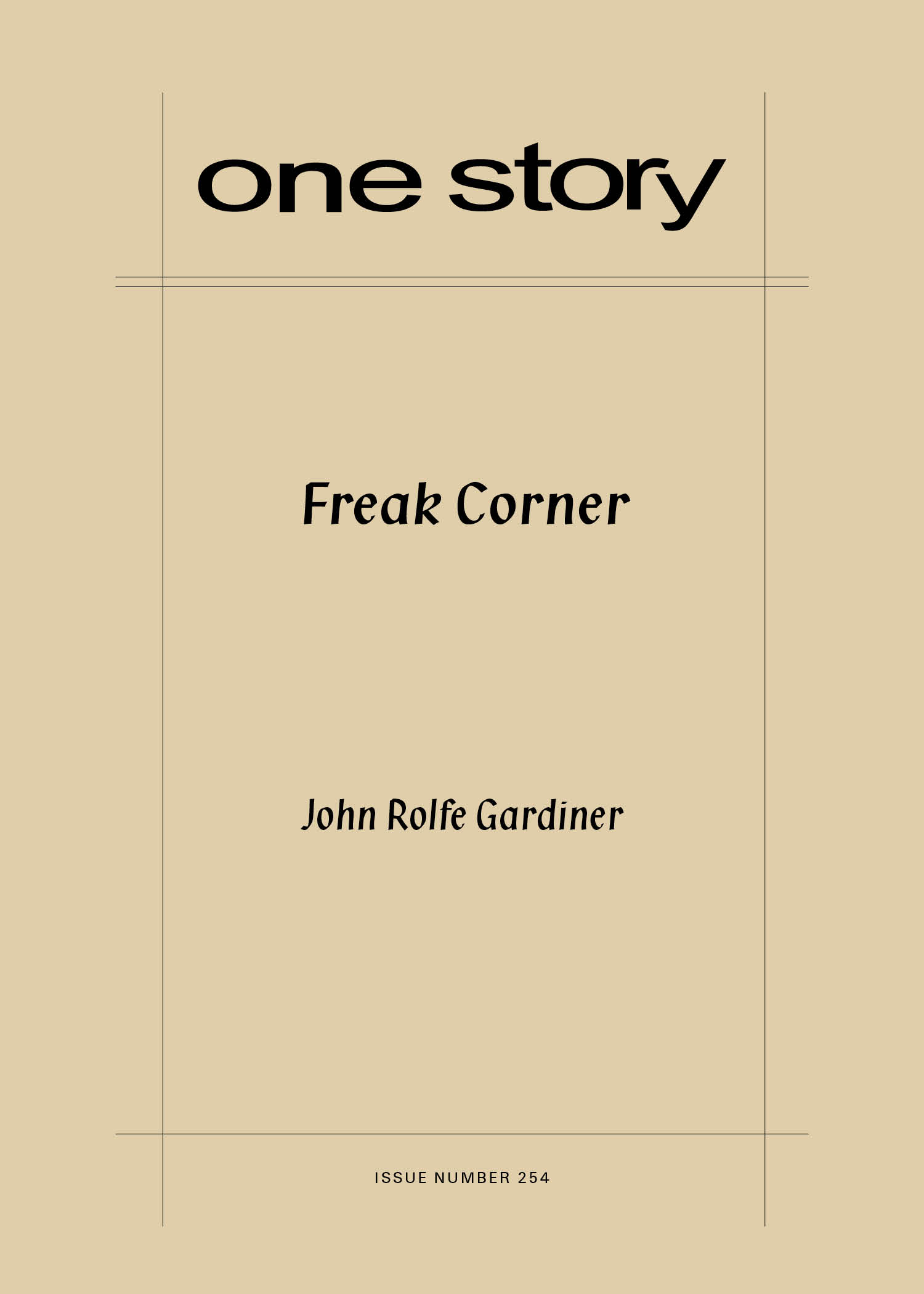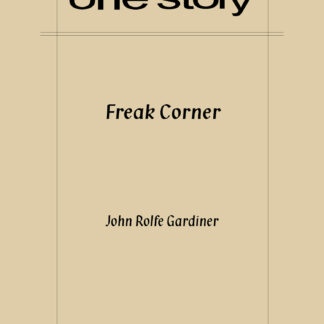
Freak Corner
$2.50
32 in stock
Excerpt
The new Margaret Kipps made her switch without going under the knife. This in mid-twentieth century when an operation for the full change might have been offered in Scandinavia, but not to Alfie Kipps of Arlington, Virginia, who became Margaret in dress and address in the summer of 1953. No loss or gain of genitalia.
I don’t remember how that detail was brought to light, whether by my parents’ investigations or the reports of shaken neighbors in the Meadow Brook development. We could only imagine the inward clap that must have concussed his household before outward reverberation shook our community to its furthest reaches, where a maiden sister in a surviving Victorian would lower her voice to begin, “My dear!”
Alfie, in his late twenties, still living at home, had been working, he told us, in the city, in the circulation office of a trade magazine as a punch-card operator, that once pervasive data management job, long extinct. The change was more shocking because Alfie had never shown us a feminine inclination. In fact, there were young women who used to drive into our development to wave at the Kipps porch, coming and going. We assumed it was a mark of Alfie’s popularity, not a sign of social reticence or sexual confusion.
John Rolfe Gardiner
John Rolfe Gardiner’s first novel, Great Dream from Heaven (1974), about a miners’ rebellion in the Tennessee coal fields, brought him honorary membership in the Mark Twain Society. His other novels include Unknown Soldiers (1977), In the Heart of the Whole World (1988), Somewhere in France (1999), Double Stitch (2003), and, most recently, Newport Rising (2017), set in revolutionary Newport, Rhode Island. He’s also the author of the short story collections Going on Like This (1983), The Incubator Ballroom (1991), and The Magellan House (2004). His fiction has ranged widely in period, place, and theme, and his stories have been included in The Best American Short Stories, The O. Henry Prize Stories, and the Pushcart Prize anthology. He lives in Unison, Virginia with his wife, Joan.
Patrick Ryan on “Freak Corner”
In the summer of 1991, I was a year out of graduate school, living in Virginia, painting houses, and working in an independent bookstore. The stock was mostly new books and, upstairs, some used books, and on slow days I would peruse the shelves and read the first pages of novels. I came across a book called Unknown Soldiers, published in 1977 and written by a writer named John Rolfe Gardiner. The first page held my interest, so I carried it back to my spot behind the register. By the end of the second chapter, I knew I was going to finish the book and wanted to own it, so I rang up the sale on the cash register, put my money in the drawer, and continued reading.
A couple of hours later, I was well into the novel when the bell over the front door jangled, and when I looked up, the author of the very book I was holding walked into the store. I looked at him, looked at book’s author photo, looked at him again. I said, “This is you, isn’t it?” He looked somewhat sheepish and confirmed that it was, indeed, him, and I—as star-struck as if I were meeting a beloved movie star—began to heap praise on this novel that he’d written fourteen years earlier. We talked for just a few minutes, and at my request, he signed the book. As I write this introduction, twenty-seven years later, that same book is sitting on a shelf a few feet away from my desk, along with all of his other books.
One Story is immensely honored to be publishing a new short story by John Rolfe Gardiner: a writer of profound abilities and agilities; a writer who has proven himself to be a master of the novel, the novella, and the short story over the course of the last four decades; a writer who remains at the top of his game to this day and who deserves to be widely read. “Freak Corner,” a story set in 1953 about a deaf girl, a cross-dresser, and a young man trying to figure out why the world reacts to them both the way it does, echoes much of our current landscape. We fear and vilify the unfamiliar now as much as we ever did. As the author says in our Q&A, “the path to reform is by way of familiarity.”
Q&A by Patrick Ryan
- PR: Where did the idea for this story come from?
- JG: Close friends had a profoundly deaf child and faced what they saw as a binary choice between oralism and signing. They lovingly insisted their child be a member of the speaking world (no signing, please). Alfie’s side of the story came from living through that era of obsession with “queers and commies,” when the obsessor-in-chief was our Director of the Federal Bureau of Investigation.
- PR: As you wrote about Gayle’s deafness and Margaret/Alfie’s transformation, and the way people in their immediate surroundings responded to them both, were there parallels you hadn’t anticipated?
- JG: Not unexpected parallels so much perhaps as discoveries that made me “only more sure of all I thought was true,” that undeserved loathing is born of ignorance and fear, and that the path to reform is by way of familiarity.
- PR: What led you to choose a first-person narrator who wasn’t either of those two characters to tell the story?
- JG: Can’t remember my thinking, but using one of the protagonists would surely complicate the telling—having a voice that pleads for itself while simultaneously pleading for another.
- PR: How different is “Freak Corner” from the story you first envisioned?
- JG: This story began as notes typed on an old Underwood. Since then it has survived the memories of two discarded computers, and now lies under the keyboard of a third, coaxed to its current form with encouragement from One Story. It always had a third person narration but the detours that brought it here lie buried beyond memory in computer graveyards. Appropriately out of sight.
- PR: Who do you imagine ends up with a better life in the long run—Alfie/Margaret, or the Knox brothers?
- JG: I drew the smug Knox boys as incorrigible. To suggest latter-day reform would be inconsistent. I think of Alfie as an empathetic humanitarian in the wrong job. I expect he would eventually find peace in some work that treats the world gently.
- PR: You’ve written books set during the American Revolution, the dawn of the twentieth century, WWI, the Depression, and WWII. You’ve also written a novel and many short stories set in more contemporary times in northern Virginia. Is there a particular time and place you haven’t written about but would like to? A particular period in history that you’re drawn to and haven’t yet approached?
- JG: I’d say the most fearsome environment for a writer is the present, here where it’s so easy to be trite, prey to familiar trope. Nor would I go in search of an unexplored era so much as an incident, once researched, that might turn the received wisdom of an era on its head.
- PR: What is the best bit of advice about writing you have ever received?
- JG: “Omit needless words,” straight out of Strunk’s Elements of Style. Everything follows from that. Of course, from lack of wit, I break the rule all the time, to my embarrassment and my stories’ detriment. Things such as “show, don’t tell,” are just corollaries of Strunk’s Einsteinian simplicity, as if he’d hit on story-telling’s E = mc2.
